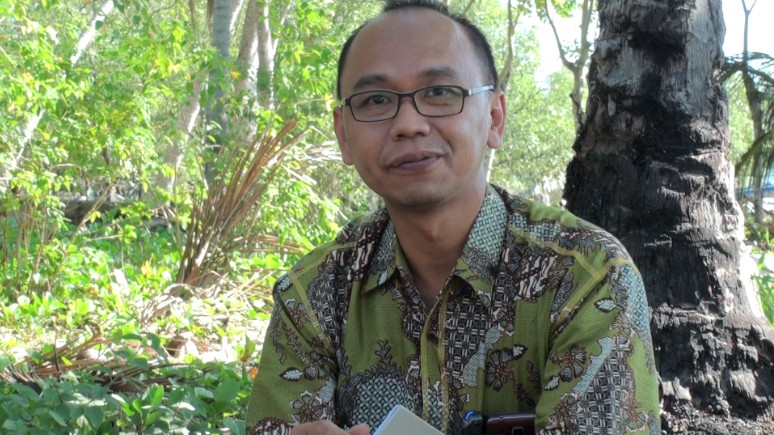
CCRES post-doc Novie Setianto takes a break during field work at Selayar, Indonesia. Photo: M. Paterson.
Meet the team: Novie Setianto, systems thinker
April 15 2016
For Novie Setianto CCRES connects his curiosity in systems thinking with interdisciplinary research and stakeholder engagement for the first time.
“The systems approach of CCRES enables me to translate systems theory - which I explored in my thesis - into a real-world activity. It’s fascinating,” Novie says.
“I’ve worked with multiple stakeholders before, yet never really used participatory systems thinking. Not at this level. Being part of CCRES gives me the opportunity to see the systems as a whole.”
Novie is a post-doc at one of the CCRES project’s in-country partners, the Center for Coastal and Marine Resources at Bogor Agricultural University, Bogor, Indonesia. He is also a graduate from The University of Queensland in Australia.
“Working with different stakeholder groups to map their socio-ecological systems is very challenging, yet interesting,” says Novie. “Hopefully, we can find some leverage points in the systems, so that we can propose decisions to improve the situations.
“We’re using and developing a unique iPad app called SESAMME to encourage stakeholders participation. Judging from participants’ engagement, I’m convinced SESAMME is an effective tool to help participants to speak and participate in the discussion.”
In 2013 Novie’s research was acknowledged by the global systems scientist community when he received an award at the International Society for the Systems Sciences (ISSS) 57th annual conference in Vietnam for his PhD paper.
As part of the CCRES systems thinking team, Novie is working with colleagues from Indonesia and Australia, seeking to develop a dynamic model of the systems in the coastal area of Selayar, the CCRES project’s pilot site in Indonesia.
The team’s first round of focus group discussions with villagers and fishers at several locations on the island of Selayar were held in October 2015. The data gathered was analysed and shared with participants during January 2016.
“We do have a common problem which has been identified by participants during the focus groups. Now, we’re finalizing rich picture-maps. Soon, we should be able to identify the systems loops in readiness to do the systems modelling.”
Simulation models will be developed to identify leverage points within the socio-ecological systems where changes in existing resource use or business activity can lead to large system-wide ecological, economic and social benefits.
For more details, contact:
Novie Setianto
Post-doc
Center for Coastal and Marine Resource Studies
Bogor Agricultural University
Bogor, Indonesia
novie.setianto@uqconnect.edu.au



